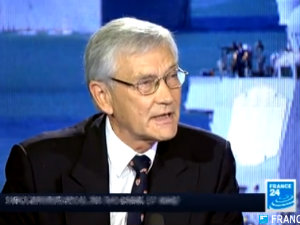Ambassador Bolewski Talks On the Geneva 2 Negotiations on Syria |
| Thursday, 30 January 2014 |
|
In the process of change to reach a new status quo acceptable to all, the following principles will have to be acknowledged: ethnic identities as ground for legitimate claims, inclusive participation, self-determination, positive incentives as well as negative sanctions and threats (the prerequisites and therefore the legitimate option of an R2P intervention on humanitarian ground by a coalition of the willing still remains on the table.) In view of the ethical pluralism in the region (Shiites, Sunnis, Kurds, Christians, Druze and various tribes) and in this identity-based (and not only geopolitical power-based) conflict, there is a need for a broad ethic of tolerance and acceptance of different points of view including the rethinking of the State in the Middle East along ethnic, linguistic and sectarian communities. In the phase of quiet diplomacy, pluralism (of religions, minorities, gender opportunities, and political parties rotating in power) as well as respect for diversity as an operating system to solve all problems will have to be recognized, since societies renew themselves through diversity. In order to impose this political mindset, the mediator will have to address the root causes, grievances and unfulfilled expectations of all concerned, rather than the obvious and immediate symptoms only." |

 On the occasion of the opening of the Geneva 2 Negotiations on Syria, AGS Professor Ambassador Wilfried Bolewski was invited on the international TV network France 24 to talk about the role of diplomacy in the resolution of the Syrian conflict. Ambassador Bolewski summarizes the points he made during his intervention:
On the occasion of the opening of the Geneva 2 Negotiations on Syria, AGS Professor Ambassador Wilfried Bolewski was invited on the international TV network France 24 to talk about the role of diplomacy in the resolution of the Syrian conflict. Ambassador Bolewski summarizes the points he made during his intervention: "International negotiations are composed of the following three phases: "megaphone" diplomacy, shuttle diplomacy, and quiet diplomacy. After the "megaphone" diplomacy with the political declarations of all sides for the gallery of their respective clientele, the mediator Brahimi should move to a shuttle diplomacy to establish personal contacts and dialogue among the parties, building a minimum of confidence in order to address options for sustainable problem-solving solutions and a diversity management.
"International negotiations are composed of the following three phases: "megaphone" diplomacy, shuttle diplomacy, and quiet diplomacy. After the "megaphone" diplomacy with the political declarations of all sides for the gallery of their respective clientele, the mediator Brahimi should move to a shuttle diplomacy to establish personal contacts and dialogue among the parties, building a minimum of confidence in order to address options for sustainable problem-solving solutions and a diversity management.


